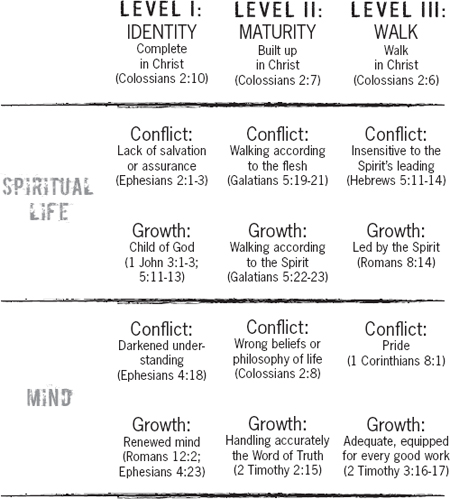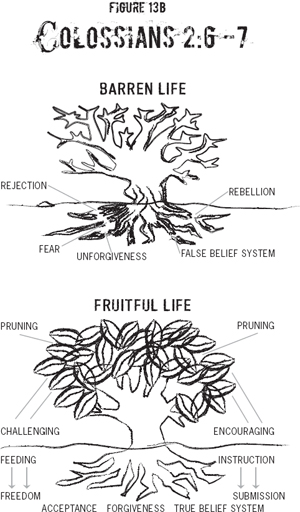
13
PEOPLE GROW BETTER
TOGETHER
“We have the awesome privilege and responsibility to be both teachers and learners of what it means to be in Christ, walk in the Spirit and live by faith.”
If you play any kind of team sport like football, baseball, basketball, soccer or volleyball, you are keenly aware of the importance of teamwork. It’s not much fun playing these games alone. You can’t play all the positions by yourself. You can’t cover all the bases. Being part of a well-coached, tightly knit team is the only way to compete and win in team sports.
God has designed His church to be a team as well. As Christians, we need each other. It’s tough living the Christian life. The temptations of the world, the flesh and the devil distract us from our walk with Christ. The pressure to make right choices among worldly friends is great. Alone we tend to get discouraged, like one player competing against nine on a baseball diamond. But together we find strength as we encourage each other, pray for each other and build each other up.
A good place for you to find the togetherness, support and team spirit you need is in a church, specifically a group of kids your age who study the Bible together, pray together and serve God together. The youth group is not just a gathering of friends. It’s an environment where you can become deeply involved in the lives of other Christian teens. It’s a place of trust where you can share your concerns, a place where people really care about you and support you for who you are in Christ. It’s a place where you and your Christian friends can help each other grow as disciples of Jesus Christ.
DISCIPLESHIP: THE HEARTBEAT OF
GROWTH AND MATURITY
Discipleship is the intensely personal activity of two or more persons helping each other experience a growing relationship with God. Every Christian is both a disciple and a discipler in his Christian relationships. We have the awesome privilege and responsibility to be both teachers and learners of what it means to be in Christ, walk in the Spirit and live by faith. We are always learning and growing in Christ through our relationships. And we always have the opportunity to help our friends and other believers grow in Christ through our caring, committed relationship with them.
In the same way, every Christian has the opportunity to be a peer counselor and to receive counsel in his Christian relationships. How much you have grown in the Lord will determine how much counseling you do. But no matter how much you have grown, there will still be times when you need to seek or receive counsel from other Christians. You may be a new Christian or come from a problem-filled past, and you are still receiving a good deal of counseling. You also need to be alert to opportunities God will give you to offer helpful advice to other believers around you.
The following designs for discipleship and concepts for counseling will give you some practical guidelines for your ministry to others.
DESIGNS FOR DISCIPLESHIP
There are three levels in the ministry of discipling others given by Paul in Colossians 2:6-10. The levels of discipleship are summarized in Figure 13A.
Level I relates to helping people with the basic issues of establishing and understanding their identity in Christ. Paul declared the finished work of who we are in Christ: “In Him you have been made complete” (Colossians 2:10).
Level II deals with the issue of maturity in Christ, which Paul called “being built up in Him” (Colossians 2:7).
Level III reflects the issue of our daily walk in Christ, which is founded on our identity and maturity. Paul instructed, “As you therefore have received Christ Jesus the Lord, so walk in Him” (Colossians 2:6).


Each level is dependent on the former level for success. A Christian cannot have an effective walk (Level III) if she is not moving into maturity (Level II), and she cannot approach maturity if she is not first rooted in Christ (Level I).
Notice also that there are five areas of application for each level: spiritual life, mind, emotions, will and relationships. In each area there is both a point of conflict and a step of growth. The point of conflict identifies how sin, the world, the flesh and the devil interfere in the discipleship process. The points of conflict indicate what must be resolved and replaced by specific steps of growth.
Level 1: Identity
Spiritual life. The point of spiritual conflict on Level I is the individual’s lack of salvation (if he has not been born again) or lack of assurance of salvation (if he has been born again). It’s not our job to give assurance of salvation; God does that (see Romans 8:16; 1 John 5:13). Our role in this step of growth is to lead people to Christ and show them Scriptures that declare their spiritual identity as children of God.
Mind. People come into the kingdom of God having little or no true knowledge of Him. People must have a knowledge of God in order to believe God and be what He wants them to be (see Hosea 4:6). Unless their minds are renewed and they develop a proper belief system, they will attempt to meet basic needs in the wrong way: independently of God.
Emotions. The emotional problem at this level is fear. Fear drives people to do what they should not do and prevents them from doing what they should do. When people are motivated by the fear of anyone or anything except God, they are not free, and freedom is our inheritance in Christ. Satan binds through fear, but the fear of God expels all other fears.
Will. Most people want to rebel against those in authority over them: God, parents, teachers, police, and so forth. Growth in this area involves learning how to submit to God and to others in authority.
Relationships. Since acceptance in the world is based on how well we perform, most people have experienced rejection from childhood. Yet the kingdom of God is based on God’s unconditional love and acceptance (see Titus 3:5). We must also build our relationships on love and acceptance, not judgment.
The first goal of discipleship is to establish identity in Christ. This entails:
1. Leading individuals to Christ and directing them to their scriptural assurance of salvation;
2. Guiding them to a true knowledge of God and who they are in Christ, and starting them down the path of knowing God’s ways;
3. Changing their basic motivation from fear of people and circumstances to fear of God;
4. Helping them see the ways they are still playing God or rebelling against God’s authority;
5. Breaking down their defenses against rejection by loving and accepting them.
Level 2: Maturity
Spiritual life. Building people up to Christ begins in the spiritual area by helping them to learn the difference between walking according to the flesh and walking according to the Spirit. The more they choose to walk according to the flesh, the longer they will remain immature. The more they choose to walk according to the Spirit, the sooner they will mature.
Mind. When Christians buy into Satan’s lie or worldly ideas, they will not be able to grow (see Colossians 2:8). The battle is for the mind, and we must learn to expose Satan’s strategies and take every thought captive (see 2 Corinthians 10:5). Discipleship requires mental discipline. People who will not take responsibility for their thoughts cannot be discipled.
Emotions. Feelings are a product of the thought life. If a person’s thoughts and beliefs are wrong concerning what will make her successful, important or happy, she will experience negative emotions. Anger, anxiety and depression are usually the result of a false belief system. Mental and emotional health are largely the byproduct of a true knowledge of God, an acceptance of His ways and the assurance of His forgiveness.
Will. In order to mature, Christians must choose to exercise self-control instead of giving in to the desires of the flesh.
Relationships. Forgiveness is the key to maturity. It is the glue that holds families and youth groups together. Satan uses unforgiveness to stop the growth of individuals and ministries. The unforgiving person is tied to his painful past or to a person who hurt him and is not free to move on in Christ.
The second goal of discipleship is to accept God’s goal to grow in Christlikeness. This means:
1. Helping people learn to walk by the Spirit and by faith;
2. Guiding them to discipline their minds to believe the truth;
3. Helping them get off the emotional roller coaster by focusing their thoughts on God instead of their circumstances;
4. Encouraging them to develop self-control;
5. Challenging them to resolve personal problems by forgiving others and seeking forgiveness.
Level 3: Walk
So many Christians want to start their journey of discipleship at this level instead of at Levels I and II. They ask, “What should I do to grow as a Christian?” when they should be asking, “Who should I be?” We can’t expect people to behave as mature Christians (Level III) before they have matured as Christians (Levels I and II). However, as believers affirm their identity in Christ and grow in maturity, we can further disciple them by challenging them to consistent Christlike behavior in their daily walk.
Spiritual life. Spiritually mature people have learned to tell the difference between good and evil (see Hebrews 5:14). This is called “spiritual discernment.” Through His Spirit, God helps mature believers recognize thoughts and activities that are being suggested by Satan. Spiritual discernment is the first line of defense in spiritual warfare.
Mind. The believer will never know so much of God and his ways that he no longer needs God. If Christians get to the place where they lean on their own understanding, they will stop acknowledging God. The honest student of God’s Word must admit that the more he knows about God, the more dependent he must be upon Him.
Emotions. The mature believer learns to be content in all circumstances (see Philippians 4:11). There are a lot of discouragements in this life, and many of the believer’s desires will go unmet. But none of his goals will go unfulfilled as long as they are godly goals.
Will. Someone has said that the successful Christian life depends on the exercise of the will. The undisciplined person is unable to live a productive life. But the disciplined person is a Spirit-filled person who has no unresolved problems and who seeks to have his needs met in Christ.
Relationships. The mature believer no longer lives for herself but for others. Perhaps the greatest test of the believer’s maturity is found in the call to “be devoted to one another in brotherly love” (Romans 12:10). After all, the world will not recognize us as true Christians by the youth group we attend, our Christian school, our appearance or our athletic trophies, but by our love.
Simply stated, the third goal of discipleship is to help believers function as believers in their homes, their schools, their youth groups and society. The effective Christian walk involves the proper exercise of spiritual gifts and talents in serving others and being a positive witness in the world. These standards are only valid when an individual accepts her identity and experiences maturity in Christ.
Sadly, most Christian teaching and preaching to youth is directed at Level III, hoping to produce better behavior. But most young Christians are stuck down around Level I, locked into the past, immobilized by fear, isolated by rejection. They have no idea who they are in Christ, so they have no way of succeeding at the Christian walk. Rather than continually telling immature believers what they should do, let’s celebrate with them what Christ has already done and help them become who they already are in Him.
CONCEPTS FOR COUNSELING
Would you be willing to commit yourself to become the kind of person someone could confide in? That’s essentially what a peer counselor is: a person with whom others feel confident in sharing the problems of their present and past. Being able to counsel someone doesn’t require that you be 18 or older or have a college degree, although those who counsel professionally can be greatly helped by receiving Bible-based training. God can use you to encourage and instruct youth with problems if you are a compassionate, caring person.
Counseling seeks to help people deal with the present by resolving problems from the past. The goal of Christian counseling— whether done by a youth pastor, a professional counselor or a caring friend—is to help people experience freedom in Christ so that they can move on to maturity and fruitfulness in their walk with Him. Here are five practical tips for the informal peer counseling God may lead you to do within your Christian relationships.
1. Help People Identify Root Issues
Psalm 1:1-3 compares the mature Christian to a fruitful tree (see Figure 13B). The fruitfulness of the branches above the ground is the result of the fertility of the soil and the health of the root system that spreads into it. Ideally, the believer is planted in the fertile soil of his identity in Christ (Level I), spreads out his roots of maturity (Level II) and bears the fruit of a productive walk in Christ (Level III).
People usually seek counseling because something is wrong with their daily walk. Instead of being fruitful, their lives are barren. As with a tree, more times than not the surface problem is only the symptom of a deeper issue. Their branches are dry and barren because there is something wrong with the root system and they are not feeding on the nourishment in the soil.
The first goal in counseling is to help the person identify the root cause for his unfruitful walk. To do this, it is helpful to determine which of his needs are not being met and how he is trying to meet those needs. His comments to you will tip off his unmet needs. For example, if he says, “I feel out of place everywhere; nobody loves me,” he needs acceptance and belonging. If he says, “I’m just a loser; I’m no good,” his needs for identity and worth are going unmet. If he says, “My life is falling apart; I’m depressed,” he needs security and hope. If he says, “I can’t do anything right,” he feels incompetent. If he says, “I can’t stop what I’m doing,” he needs freedom.
In order to expose his root problem, you need to help him work through several critical questions within the five areas illustrated in Figure 13A. The questions below should not be asked to the person directly because he may not know the answers. But they are questions you need to keep in mind as you talk with him.
Emotions. The emotional level is a good place to start because your friend’s negative feelings are probably what brought him to you for advice. Try to understand: When did he begin to feel this way? What events surrounded that experience? What does he think about the event? What unfulfilled “goals” do his feelings reveal?
Mind. What does he believe about God? About himself? About success in life? Guiding the person through the Belief Quiz (see chapter 7) will help him discover his present belief system.

Will. How does he respond to authority? In what ways is he playing God? Is he responsible to a youth pastor or a local church? Is he weak-willed, unable to say no or to stand alone? Does he believe he is controlled by life’s events? Is he undisciplined? Does he act without thinking?
Relationships. What expectations does he have of God and others? Who does he need to forgive? From whom does he need to seek forgiveness? What people skills does he lack? Does he have a support system (family, friends, youth group)?
Spiritual life. What is his present standing with God? Does he know how to walk according to the Spirit? Is he sensitive to the Holy Spirit’s leading? Does he have a quiet time with God consisting of prayer and Bible study?
2. Encourage Emotional Honesty
People are generally willing to share what has happened to them, but they are not usually willing to share their failures or how they feel about them. Unless you can encourage them to emotional honesty, their chances of solving their inner problems are slim. You cannot be right with God and not be real emotionally.
When a Christian keeps his emotions in the dark by not sharing them honestly, he gives Satan a foothold. When a person honestly admits how he feels in an attempt to solve his problems, he exposes his soul to God’s light. Satan and his demons are like cockroaches. When the light invades their territory, they run for the shadows. Emotional honesty keeps the devil on the run.
3. Share the Truth
When your Christian friends come to you for advice or counseling, it’s usually because their problems have caused them to think there is something wrong with them. They may feel that God can’t possibly love them.
What a privilege to share with them the truth of their identity in Christ and help them repair their faulty belief system. Keep several copies of the “Who Am I?” list from chapter 2 and “Since I Am in Christ” list from chapter 3 handy. When you talk to someone who reveals distorted ideas about himself, give him one of those lists and ask him to read through it aloud. The transformation you’ll see in people is incredible because they are applying the truth of God’s Word to their faulty belief system.
4. Call for a Response
Your role in advising and counseling your friends is to share the truth in love and pray that they will choose to accept it. But you cannot choose for them. Good scriptural advice must be received by faith.
Our Lord said to those seeking His healing touch, “Your faith has made you well; go in peace and be healed of your affliction” (Mark 5:34); “Go; it shall be done for you as you have believed” (Matthew 8:13). If those you share with don’t want help or choose to not believe, there isn’t much you can do to help them.
The response we desire in our peer counseling is that of repentance, which means a changing of the mind. The person seeking help needs to change his mind about what he will believe about God and himself. Only after he changes his mind and changes his beliefs can he change his walk.
5. Help Them Plan for the Future
One of the most important ways to help people move from problems and despair to growth, maturity and hope is to help them develop a support system of relationships. Encourage them to rely on the prayers, fellowship and instruction they receive in a loving family, a youth group or a cluster of close Christian friends.
Help your friends see the difference between what is and what can be in their lives. Change in belief and behavior takes time. People need to realize the important difference between goals and desires, or they will try to change things and people that are beyond their right or ability to change. Encourage your friends to face each day of growth with the attitude expressed in the popular prayer, “God grant me the serenity to accept the things I cannot change, the courage to change the things I can, and the wisdom to know the difference.”
We are what we are by the grace of God. All we have and can hope for—as disciplers and disciples, as counselors and people in need of counsel—is based on who we are in Christ. May your life and your ministry to others be shaped by your devotion to Christ and the conviction that He is the way, the truth and the life (see John 14:6). And may God grant us all the privilege of seeing people escape the shadows and mature in the light.
TRUTH ENCOUNTER
1. Why is it so important that you be a part of a youth group?
2. Why should we celebrate who a person is in Christ, rather than tell him what he does is wrong?
3. Why is emotional honesty so important?
4. What is a good balance between being a good disciple and a discipler?
